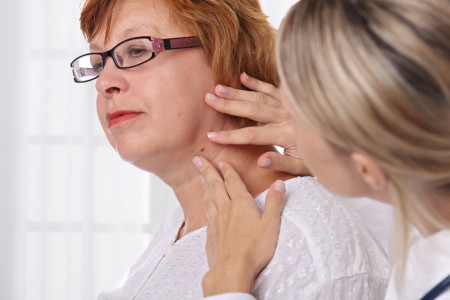How to care for your skin in your 60s and 70s

-
Shower to relieve dry skin. A few simple changes to your bath time can reduce (or lessen) dry, itchy skin and prevent dry, itchy skin from becoming a serious problem. You can do the following:
- Wash with a mild, fragrance-free, moisturizing soap, cleanser or body wash. Doing so helps soothe rather than dry the skin. Moisturizing ingredients that help reduce dryness include Glycerin, Hyaluronic Acid and Lanolin.
- Use lukewarm water (not hot water). Hot water strips the skin of its natural oils, which can increase dryness.
- Clean skin with a soft cloth. Powder puffs or bath brushes can irritate your skin.
- Keep time in the bath or shower short. You may find that you don’t need to shower every day. Keep your bath time short. Take a 5 to 10 minute bath or shower.
- Gently pat water off skin after bathing, but leave a little water on skin. When you apply moisturizer (next step), leaving some water on your skin will help moisturize your skin.
- Use a creamy, fragrance-free moisturizer specially formulated for dry skin within 3 minutes of showering and throughout the day. Moisturizing helps relieve dryness and restore skin’s protective barrier. When your skin feels very dry, dermatologists recommend using ointments instead of creams. Ointments keep the skin hydrated better than creams.
skip bath oil
Moisturizing your skin with bath oils increases the risk of slipping, so it’s best to avoid them.

-
Use a humidifier when the air feels dry. Heating and air conditioning remove moisture from the air. Dry air can leave your skin feeling dry and itchy.
Keeping indoor humidity between 45% and 60% can reduce dry, itchy skin. You can easily measure the humidity in the air with a hydrometer, which you can buy at a hardware or home improvement store.
How skin changed in the 60s and 70s
Everyone ages differently, but during this time in your life you may notice your skin:
- dryer
- Thinner and starting to look like paper
- itch
- More age spots, lines and wrinkles
- Blocher
- easily irritated
- more susceptible to skin infections
- bruises more easily
- sweat less
- heal more slowly
-
Wear gloves when doing housework and gardening. Working around your house and garden can expose your skin to harsh chemicals, sunlight, and other substances that can irritate and dry out your skin.
You also reduce the risk of injuring your skin when you wear gloves.
-
Protect your skin from the sun. If you’re seeing more wrinkles, age spots, bruising, and discolored skin spots, you may be wondering if you still need to protect your skin from the sun.
you do! At this stage of your life, sun protection still has many benefits. It helps prevent new age spots and blotchy skin. It reduces dry, thinned skin. It can also reduce the risk of skin cancer.
To protect your skin from the sun’s harmful rays, dermatologists recommend that you:
- Seek shade when outdoors. Seek shade when appropriate and remember the sun’s rays are strongest between 10am and 2pm
- Wear clothing that protects your skin from the sun. Wear lightweight long-sleeved shirts, pants, wide-brimmed hats, and UV-blocking sunglasses whenever possible. For extra protection, choose clothing that has an Ultraviolet Protection Factor (UPF) on the label.
- Use a broad-spectrum, water-resistant sunscreen with SPF 30 or higher. When you’re outside, you want to apply it to all the skin that your clothes won’t cover.
-
Fragrance free. Fragrances can irritate your skin. To help heal dry, itchy skin and prevent it from coming back, stop using perfume, cologne, and scented skin care products.
Fragrance-free products are labeled “fragrance-free” on the package.
“Fragrance-free” and “fragrance-free” have different meanings
Unscented products can irritate dry skin because unscented products often contain a chemical that masks the smell of other ingredients so you can’t smell them. Be sure to use fragrance-free products.
-
Check your skin for signs of skin cancer. Around age 50, your risk of developing skin cancer and precancerous lesions increases. This risk increases as the years pass.
When skin cancer is caught early and removed, it’s often the only treatment you need. If the cancer has spread, treatment becomes more difficult.
Learning how to check your skin for signs of skin cancer can help you spot skin cancer early.To learn how to check your skin, watch How to Do a Skin Self-Exam.
If you notice that an area is different from others, or is changing, itching, or bleeding, you should make an appointment to see a board-certified dermatologist.
Dermatologist examining patient’s skin for signs of skin cancer
If you notice that an area is different from others, or is changing, itching, or bleeding, you should make an appointment to see a board-certified dermatologist.

